The backgammon chouette is a variant of backgammon for three or more players. Traditionally played in person, today, the internet allows this form of backgammon to be played across different countries and various platforms. The chouette is a fast-paced game, featuring frequent use of the doubling cube, discussion and dispute of possible moves, and shifting rivalries among players.
One player—the box—plays against a team consisting of all other participants. One member of the team is designated as the captain. The box and the rotation order are generally determined by the roll of dice.
The game is played on a single backgammon board according to standard rules. The captain makes the final decision on all checker plays for the team, although help from team-mates can be requested in some situations. Usually, all members of the team have their own doubling cube vs. the box, and can double regardless of what other team-mates do, and they can accept or refuse a double independently of the other players. The result is that, although they are using a single backgammon set, each member on the team is playing a separate game against the box.
A chouette is generally played in the same way as backgammon money play. There is no "match score"; one game is played, scores are tabulated, and another game begins. The positions of the players are rotated after each game. In general, if the box wins, this player remains the box. If the captain wins, the captain becomes the box for the next round. The loser goes to the bottom of the order and all other players move up one spot. In one variation, team members who successfully accepted or declined a double progress ahead of those who made the wrong decision.
Each player maintains a running score, corresponding to the number of points won or lost in each game, adjusted for gammons, backgammons, and the value of the doubling cube.

Blackjack is a casino banking game. The most widely played casino banking game in the world, it uses decks of 52 cards and descends from a global family of casino banking games known as Twenty-One. This family of card games also includes the British game of Pontoon, the European game, Vingt-et-Un and the Russian game Ochko. Blackjack players do not compete against each other. The game is a comparing card game where each player competes against the dealer.

Backgammon is a two-player board game played with counters and dice on tables boards. It is the most widespread Western member of the large family of tables games, whose ancestors date back nearly 5,000 years to the regions of Mesopotamia and Persia. The earliest record of backgammon itself dates to the 17th century England; being descended from the 16th-century game of Irish.

Pinochle, also called pinocle or penuchle, is a trick-taking, Ace-Ten card game typically for two to four players and played with a 48-card deck. It is derived from the card game bezique; players score points by trick-taking and also by forming combinations of cards into melds. It is thus considered part of a "trick-and-meld" category which also includes the game belote. Each hand is played in three phases: bidding, melds, and tricks. The standard game today is called "partnership auction pinochle".
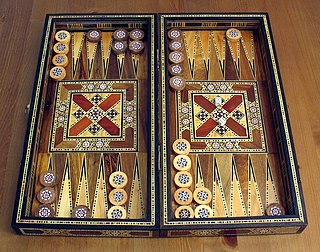
Tables games are a class of board game that includes backgammon and which are played on a tables board, typically with two rows of 12 vertical markings called points. Players roll dice to determine the movement of pieces. Tables games are among the oldest known board games, and many different varieties are played throughout the world. They are called 'tables' games because the boards consist of four quadrants or 'tables'. The vast majority are race games, the tables board representing a linear race track with start and finish points, the aim being to be first to the finish line, but the characteristic features that distinguish tables games from other race games are that they are two-player games using a large number of pieces, usually fifteen per player.

Nard is an historical Persian tables game for two players that is sometimes considered ancestral to backgammon. It is still played today, albeit in a different form. As in other tables games, the playing pieces are moved around a board according to rolls of dice. It uses a standard tables board, but has a different opening layout and rules of play from that of backgammon.
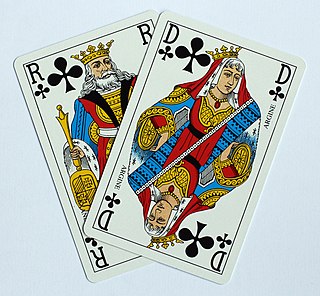
Belote is a 32-card, trick-taking, Ace-Ten game played primarily in France and certain European countries, namely Armenia, Bulgaria, Croatia, Cyprus, Greece, Luxembourg, Moldova, North Macedonia, Bosnia and Herzegovina and also in Saudi Arabia. It is one of the most popular card games in those countries, and the national card game of France, both casually and in gambling. It was invented around 1920 in France, and is a close relative of both Klaberjass and Klaverjas. Closely related games are played throughout the world. Definitive rules of the game were first published in 1921.

Mario Superstar Baseball is a 2005 sports video game developed by Namco and published by Nintendo for the GameCube. The game was created in the vein of other Mario sports games such as Mario Golf: Toadstool Tour and Mario Power Tennis. A sequel, Mario Super Sluggers, was released for the Wii in 2008.
Hypergammon is a variant of backgammon.

Harry Potter: Quidditch World Cup is a 2003 sports action video game that features the fictional sport of Quidditch from the Harry Potter franchise. The game was developed by two teams, EA UK and Magic Pockets, and was published by Electronic Arts. It was released for Game Boy Advance, Microsoft Windows, PlayStation 2, Xbox, and GameCube. The game bears no relation to the abandoned Nintendo 64 project.
Sueca is a 4 player-partnership point trick-taking card game of the Ace-Ten family, and a popular variant of the Bisca card game. The game is played in Portugal, Brazil, Angola and other Portuguese communities. Its closest relative is the very similar German game Einwerfen.
Tavli, sometimes called Greek Backgammon in English, is the most popular way of playing tables games in Greece and Cyprus and is their national board game. Tavli is a compendium game for two players which comprises three different variants played in succession: Portes, Plakoto and Fevga. These are played in a cycle until one player reaches the target score - usually five or seven points.
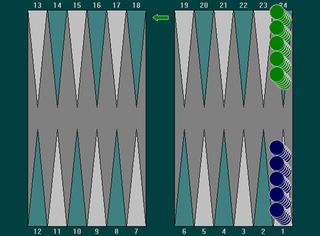
Tapa (Тапа) is a tables game played in Bulgaria and North Macedonia. It is also played in Greece, where it is known as Plakoto. The word tapa means bottle cap.
The first moves of a backgammon game are the opening moves, collectively referred to as the opening, and studied in the backgammon opening theory. Backgammon opening theory is not developed in as much detail as opening theory in chess, which has been widely studied. The reason for this is that following the first move in backgammon, there are 21 dice roll outcomes on each subsequent move, and many alternative plays for each outcome, making the tree of possible positions in backgammon expand much more rapidly than in chess.

Muggins, sometimes also called All Fives, is a domino game played with any of the commonly available sets. Although suitable for up to four players, Muggins is described by John McLeod as "a good, quick two player game".
In backgammon, there are a number of strategies that are distinct to match play as opposed to money play. These differences are most apparent when a player is within a few points of winning the match.
The Genius: Rule Breaker is the second season of The Genius, which debuted on tvN on December 7, 2013.
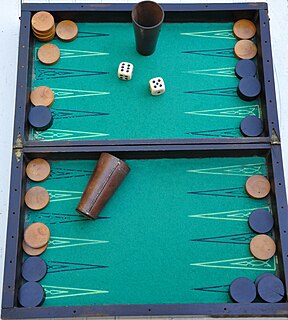
The following is a glossary of terms used in tables games, essentially games played on a Backgammon-type board. Terms in this glossary should not be game-specific, but applicable to a range of tables games.
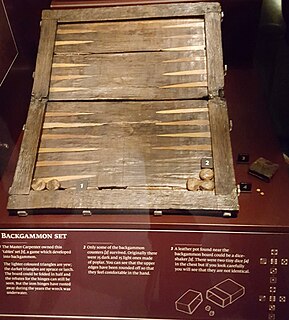
Irish or the Irish Game was an Anglo-Scottish tables game for two players that was popular from the 16th to the mid-18th centuries before being superseded by its derivative, the "faster paced" backgammon. In its day, Irish was "esteemed among the best games at Tables." Its name notwithstanding, Irish was one of the most international forms of tables games, the equivalent of French toutes tables, Italian tavole reale and Spanish todas tablas, the latter name first being used in the 1283 El Libro de los Juegos, a translation of Arabic manuscripts by the Toledo School of Translators.
Tawula, sometimes also called Turkish Backgammon in English, is an historical tables game once popular in Asia Minor and Egypt.
Fevga is a popular Greek tables game for two players. It is usually played as one of three different games in succession – the others being Portes and Plakoto – in social gatherings or coffee shops. When played in this way, it is known as Tavli. Very similar games, with slight variations, are Turkish Moultezim, Russian Narde and Egyptian and Lebanese Tawla 31.